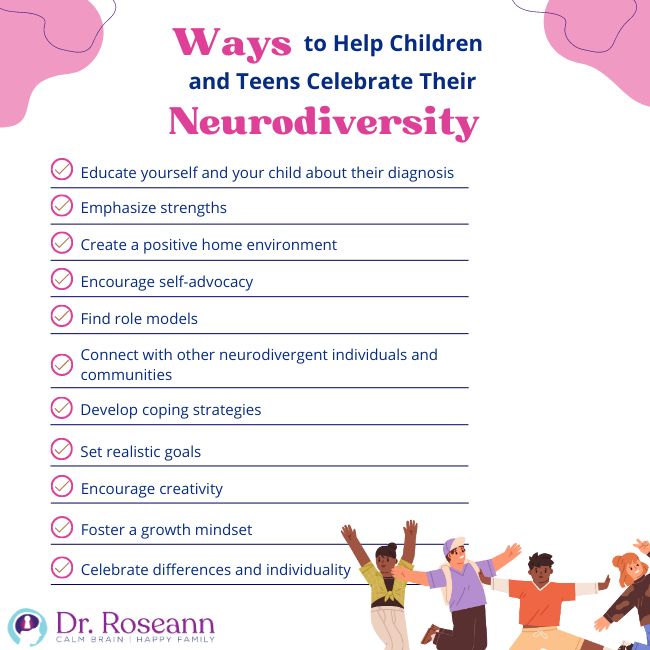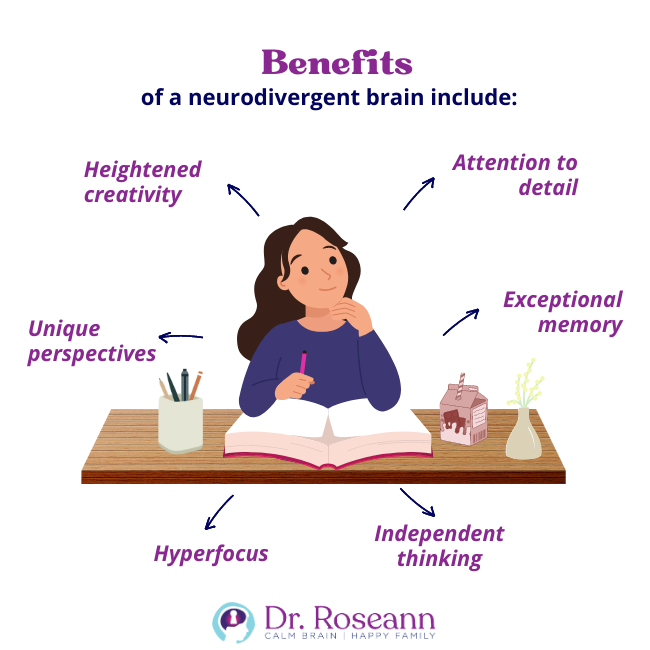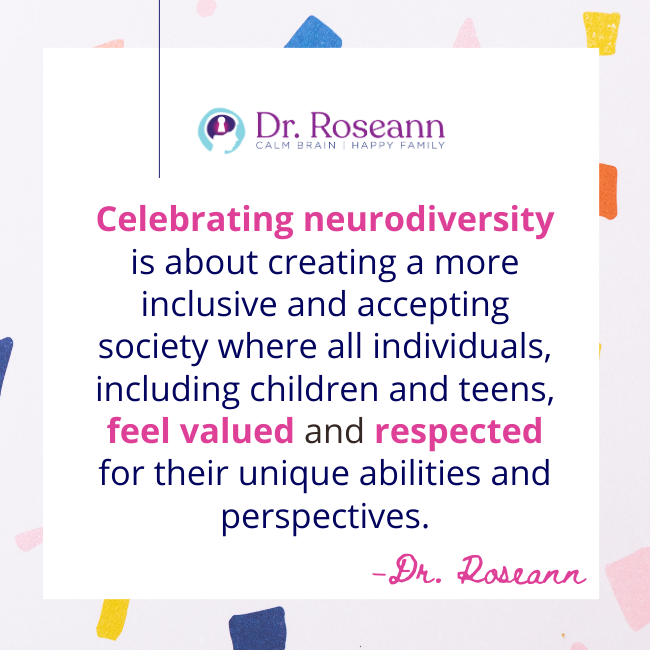The term neurodiversity is one I am sure you have heard but may not be sure what it means. Neurodiversity is the concept that all brains are unique and different and that these differences are not abnormal but natural variations of the human brain.
A sociologist named Judy Singer coined the term in the 1960s. With such an increase in Autism Spectrum Disorder (ASD) and Attention Deficit Hyperactivity Disorder (ADHD), we hear the term more and more.
Children and teens who are neurodivergent, or those whose brains work differently than the typical brain, can often face challenges in feeling accepted and included in society. Those with autism and ADHD are two examples of neurodivergent brains that might struggle in academic settings. Some neurodivergent children don't have a formal diagnosis, but it is about how people's brains work.
Many people are afraid for their neurodivergent child if they don't “fit in the box.” While it's normal to be worried about your kids, with so many children in the United States with neurodevelopmental disorders and clinical mental health issues, being different is the norm.
When we accept our children with all of their differences, they are able to be themselves without so much stress. Neurodiverse kids are unique learners who also have many gifts, and they need to embrace neurodiversity.
And most certainly, by embracing and celebrating their neurodiversity, children and teens can develop a positive self-image and feel proud of their unique abilities and perspectives.
Ways to Help Children and Teens Celebrate Their Neurodiversity
#1 Educate yourself and your child about their diagnosis
It's important to understand what neurodiversity is and how it can affect your child or teen. Learn about your child's specific neurodivergent condition, whether it's ADHD, autism, dyslexia, or another condition.
This will help you understand their unique strengths and challenges and how to support them in the best way possible. Additionally, reading up on other successful neurodivergent individuals and their experiences can help your child feel less alone and more understood.
#2 Emphasize strengths
All individuals have unique strengths and talents, including those who are neurodivergent. Focus on identifying and highlighting your child's strengths, whether it's their creativity, problem-solving abilities, or attention to detail.
Encourage them to pursue activities that allow them to use and showcase these strengths. This can help build their confidence and sense of self-worth. Help them to shift their mindset from seeing their condition as a limitation to seeing it as a source of strength and unique perspective.
#3 Create a positive home environment
Make your home a safe and accepting space for your child or teen. This means creating an environment that is free of judgment and criticism and where their unique abilities and challenges are accepted and embraced.
Encourage open communication and honest conversations, and work to build a sense of trust and understanding between you and your child.
#4 Encourage self-advocacy
Teach your child or teen to advocate for themselves and their needs. Encourage them to communicate their needs and preferences to their teachers, peers, and other adults in their lives.
This can help them develop a sense of agency and empowerment, and feel more in control of their lives and experiences. Being different can feel out of control for you and your child, so empowering them is just how to counter that.
#5 Find role models
Look for successful individuals who are open about their neurodivergent condition and can serve as positive role models for your child. This can help your child feel less alone and more inspired to pursue their passions.
Temple Grandin is one of the most well-known and inspiring autistic individuals. She is known for revolutionizing how cattle are managed, supporting their sensory needs to be more human. Her messages were widely adopted by the meat industry. Her methods came from her own sensory needs that she turned into a revolutionary way to support cattle.
#6 Connect with other neurodivergent individuals and communities
Help your child or teen connect with other neurodivergent individuals and communities. This can be in the form of support groups, online communities, or local events and activities.
Being part of a community of people who share similar experiences can be a powerful way for your child to feel understood, accepted, and celebrated.
#7 Develop coping strategies
Help your child develop coping strategies to manage any challenges they may face as a result of their neurodivergent condition. Many neurodivergent brains are more easily stimulated, so it's important to calm the brain to reduce stress levels, and having a go-to coping strategy is something that can help them throughout their life.
This can include strategies to manage sensory overload, anxiety, and other common issues. It also can mean adding science facts and technology, such as CALM PEMF™.
#8 Set realistic goals
Help your child set realistic goals for themselves and work with them to develop a plan to achieve these goals. Many neurodivergent individuals are highly sensitive to the environment around them and may feel the pressure more easily.
They have to learn, as most people do, that things don't have to be perfect in order to be successful. This can help build their confidence and sense of achievement. Parents can cultivate behavioral change on their own but should also be open to behavior therapy through parent coaching.
They also often have executive functioning issues that need to be addressed before we layer on too many tasks. Once foundational executive functioning skills have been taught, outcomes can be improved.
#9 Encourage creativity
Encourage your child to express themselves creatively, such as through art, music, or writing. So much of the focus today is on kids getting good grades. When we over, focus on academics, we miss out on developing the unique strengths that our child has, they could lead to lifelong, fulfilling careers.
And hobbies and creative activities can also be a positive outlet for them to explore their emotions and experiences. It also can be a great place for them to make friends.
#10 Foster a growth mindset
Encourage your child or teen to adopt a growth mindset, which means believing that their abilities can be developed through dedication and hard work. When we teach our brain to focus on the positive, instead of the negative, children are able to work outside of what others think they can or can't do.
Limiting beliefs an individual has often develops young and it's important for parents to role model and reinforce the growth mindset. This can help them overcome challenges and setbacks, and approach their neurodivergent condition as a source of strength and growth, rather than a limitation.
#11 Celebrate differences and individuality
It is important that you and your child celebrate and embrace differences. Encourage your child or teen to appreciate and learn from the differences of others, and to recognize that all individuals have unique perspectives and experiences to offer. Also, encourage them to appreciate their own unique qualities and those of others.
Recognizing positive accomplishments of others, can help build empathy and understanding, and create a more inclusive and accepting society for all individuals.
Benefits of a Neurodivergent Brain
Neurodivergent individuals have brains that function differently from the neurotypical population. While neurodivergent individuals may face certain challenges, such as difficulty with attention, social interaction or sensory processing, there are also many benefits associated with having a neurodivergent brain.
Edmond was a young boy who was labeled as “behavioral” by the first grade, and was in trouble all the time. His mom realized that Edmond probably had ADHD like the rest of the family. And instead of letting him sit in school, and think he was “dumb,” she decided to pull him out and homeschool him. Homeschooling was a great option for Edmond who just needed to move because his mind was always busy. He was homeschooled until the sixth grade, where he then transitioned back to school and was put into the gifted program. He continued to excel in school and his neurodivergent, creative mind served him well throughout his life.
Benefits of a neurodivergent brain include:
Heightened creativity: Research has suggested that some neurodivergent individuals, such as those with dyslexia, autism or ADHD, may have enhanced creative thinking abilities. They may be more likely to think outside the box and come up with unique and innovative ideas.
Attention to detail: Some neurodivergent individuals, such as those with autism, anxiety or OCD, may be highly detail-oriented and have a great capacity for focused attention. This can be beneficial in certain professions that require meticulous attention to detail, such as engineering or computer programming.
Unique perspectives: Neurodivergent individuals may see the world in a unique way that allows them to make connections and insights that others may not see. This can be beneficial in fields such as art, science, or philosophy.
Exceptional memory: Some neurodivergent individuals, such as those with ADHD, autism, or dyslexia, may have exceptional memory capabilities. They may be able to remember details and information that others may overlook or forget.
Hyperfocus: Some neurodivergent individuals may have the ability to hyperfocus on tasks they are interested in or passionate about. Individuals with ADHD often can hyperfocus. This can be a valuable skill in certain professions that require intense concentration and focus.
Independent thinking: Neurodivergent individuals may have a greater capacity for independent thinking and problem-solving. They may be less influenced by social norms and expectations, allowing them to think outside the box and come up with unique solutions.
It is important to remember that neurodivergent people are a beautiful weave in the patchwork of our world. With the increase in neurodiverse people, it has led to this neurodiversity movement, that neurotypical people and the neurodiverse are celebrating. It frees people from feeling like they have to “fit in the box.”
Celebrating neurodiversity is about creating a more inclusive and accepting society where all individuals, including children and teens, feel valued and respected for their unique abilities and perspectives. While neurodivergent individuals may face certain challenges in their daily lives, they also have many strengths and advantages that can be celebrated and leveraged.
Helping neurodiverse students reach their full potential should be the standard in our educational system and special needs parents are driving that change.
By educating yourself, emphasizing strengths, creating a positive home environment, encouraging self-advocacy, connecting with other neurodivergent individuals, fostering a growth mindset, and celebrating differences, you can help your child or teen embrace and celebrate their neurodivergent identity, and feel proud of who they are.
By embracing neurodiversity, we can work towards a more inclusive and accepting society that values and appreciates the unique strengths and abilities of all individuals.
Citations:
Krzeminska, Anna & Austin, Robert & Bruyere, Susanne & Hedley, Darren. (2019). The advantages and challenges of neurodiversity employment in organizations. Journal of Management & Organization. 25. 453-463. 10.1017/jmo.2019.58.
Ortiz, L. A. (2020). Reframing Neurodiversity as Competitive Advantage: Opportunities, Challenges, and Resources for Business and Professional Communication Educators. Business and Professional Communication Quarterly, 83(3), 261–284. https://doi.org/10.1177/2329490620944456
Rentenbach, B., Prislovsky, L., & Gabriel, R. (2017). Valuing differences:: Neurodiversity in the classroom. Phi Delta Kappan, 98(8), 59–63. https://doi.org/10.1177/0031721717708297
Always remember… “Calm Brain, Happy Family™”
Are you looking for SOLUTIONS for your struggling child or teen?
Dr. Roseann and her team are all about solutions, so you are in the right place!
There are 3 ways to work with Dr. Roseann:
You can get her books for parents and professionals, including: It’s Gonna Be OK™: Proven Ways to Improve Your Child’s Mental Health, Teletherapy Toolkit™ and Brain Under Attack: A Resource For Parents and Caregivers of Children With PANS, PANDAS, and Autoimmune Encephalopathy.
If you are a business or organization that needs proactive guidance to support employee mental health or an organization looking for a brand representative, check out Dr. Roseann’s media page and professional speaking page to see how we can work together.
Dr. Roseann is a Children’s Mental Health Expert and Therapist who has been featured in/on hundreds of media outlets including, CBS, NBC, FOX News, PIX11 NYC, The New York Times, The Washington Post,, Business Insider, USA Today, CNET, Marth Stewart, and PARENTS. FORBES called her, “A thought leader in children’s mental health.”

She is the founder and director of The Global Institute of Children’s Mental Health and Dr. Roseann Capanna-Hodge. Dr. Roseann is a Board Certified Neurofeedback (BCN) Practitioner, a Board Member of the Northeast Region Biofeedback Society (NRBS), Certified Integrative Medicine Mental Health Provider (CMHIMP) and an Amen Clinic Certified Brain Health Coach. She is also a member of The International Lyme Disease and Associated Disease Society (ILADS), The American Psychological Association (APA), Anxiety and Depression Association of America (ADAA) National Association of School Psychologists (NASP), International OCD Foundation (IOCDF) International Society for Neurofeedback and Research (ISNR) and The Association of Applied Psychophysiology and Biofeedback (AAPB).
© Roseann-Capanna-Hodge, LLC 2023
Disclaimer: This article is not intended to give health advice and it is recommended to consult with a physician before beginning any new wellness regime. *The effectiveness of diagnosis and treatment vary by patient and condition. Dr. Roseann Capanna-Hodge, LLC does not guarantee certain results.
















